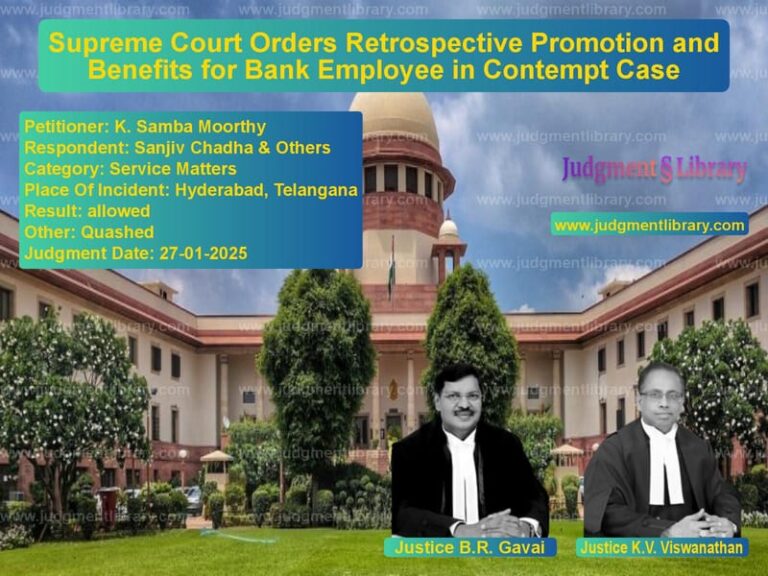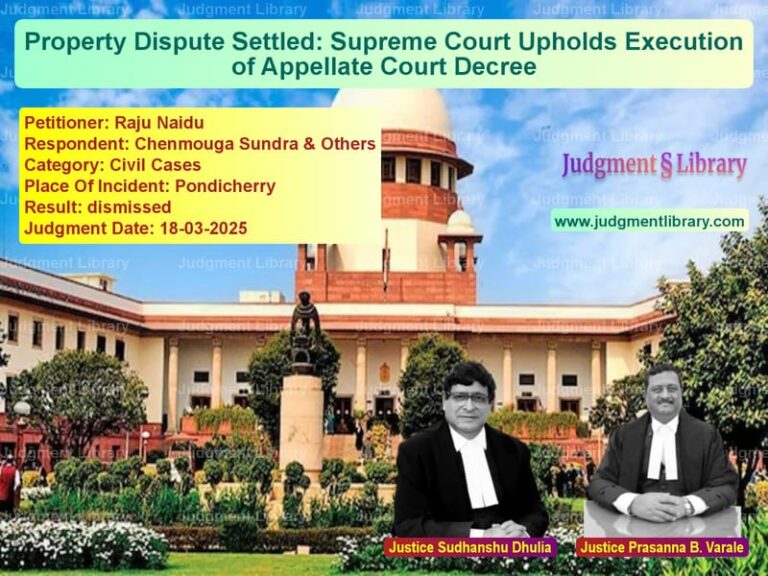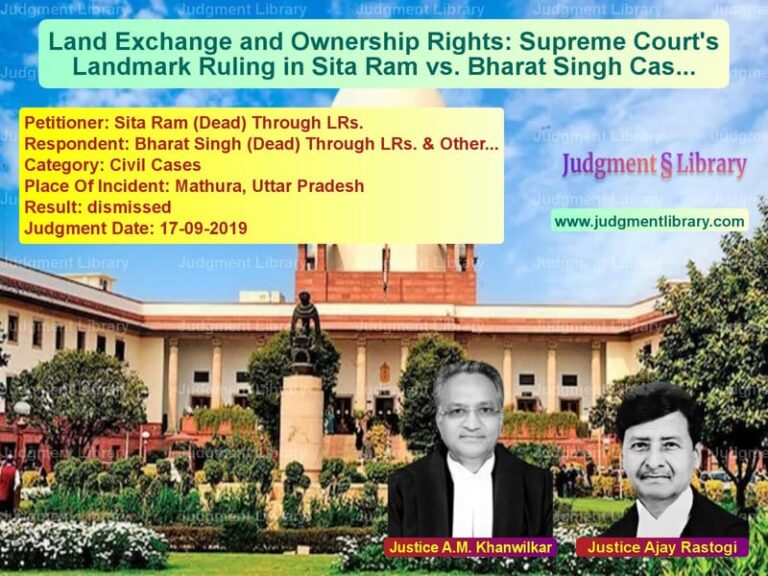Supreme Court Upholds Conviction in Murder Case: Common Intention Under IPC 34 Explained
The case of Maheshwari Yadav & Anr. v. The State of Bihar revolves around the legal principles of common intention under Section 34 of the Indian Penal Code (IPC) and the evidentiary requirements in a murder conviction. The Supreme Court was tasked with determining whether the conviction of the appellants under Section 302 read with Section 34 IPC was justified.
Background of the Case
The prosecution’s case was based on an incident that occurred on March 10, 1997, in Village-Chhitmakhanpur, Bihar. The victim, Gholti Yadav, was accompanying PW-4 (Jagdish Manjhi) and PW-5 (Narayan Manjhi) to catch a train when they encountered the accused persons:
- Appellant No.1 – Maheshwari Yadav (allegedly carrying a lathi).
- Appellant No.2 – Mannu Yadav (allegedly instigating the murder).
- Accused No.3 – Paro Yadav (allegedly firing the fatal shot with a musket).
According to the prosecution, appellant No.2 instigated accused No.3 to fire at the victim, who was shot in the back and later collapsed in a wheat field. The prosecution further alleged that the appellants assaulted PW-4 and PW-5 when they tried to intervene.
The Trial Court convicted:
- Accused No.3 – Under Section 302 IPC (murder) and sentenced to life imprisonment.
- Appellant Nos.1 and 2 – Under Section 302 read with Section 34 IPC for sharing common intention in the murder.
The Patna High Court dismissed the appeals of all three accused, upholding their convictions. Accused No.3’s appeal was later dismissed by the Supreme Court in 2006. The present appeal was filed by Appellant Nos.1 and 2.
Legal Issues Raised
- Was there sufficient evidence to prove common intention between the appellants and Accused No.3?
- Was the testimony of eyewitnesses reliable?
- Did the delay in filing the First Information Report (FIR) cast doubt on the prosecution’s case?
Arguments of the Appellants
The appellants’ counsel argued:
- Appellant No.1 was only present at the scene but did not participate in the attack.
- Appellant No.2 was merely accused of instigating Accused No.3, but no direct role was attributed to him.
- The prosecution witnesses (PW-1 to PW-5) were family members of the deceased and, therefore, interested witnesses, making their testimony unreliable.
- Two alleged eyewitnesses were not examined, leading to an adverse inference against the prosecution.
- There was an eight-hour delay in registering the FIR, raising suspicions of afterthought and fabrication.
Arguments of the Respondent (State of Bihar)
The prosecution countered:
- Both the Trial Court and High Court had properly evaluated the evidence and upheld the conviction.
- The testimonies of PW-1 to PW-5 were consistent and corroborated by medical evidence.
- The presence of Appellant Nos.1 and 2 at the scene, their possession of weapons, and their role in the attack established common intention with Accused No.3.
Supreme Court’s Observations
1. Common Intention Under Section 34 IPC
The Court clarified the application of Section 34 IPC, which imposes vicarious liability when multiple persons act in furtherance of a common intention:
“To bring a case within Section 34, it is not necessary to prove prior conspiracy or premeditation. Common intention can be formed just before or during the occurrence.”
The Court noted that both appellants were present at the scene, armed with sticks, and did not attempt to prevent Accused No.3 from firing the fatal shot. This indicated active participation and a shared intent.
2. Reliability of Eyewitnesses
The Court rejected the argument that the prosecution witnesses were unreliable because they were related to the deceased:
“The mere fact that witnesses are relatives does not render their testimony unreliable. Their statements must be examined for consistency and corroboration.”
PW-1 to PW-4 consistently testified that:
- Appellant No.2 exhorted Accused No.3 to fire at the deceased.
- Appellant No.1 and No.2 were present at the scene with weapons.
- After the fatal shot, the appellants attacked PW-4 and PW-5.
3. Delay in FIR Filing
The Court held that an eight-hour delay in filing the FIR was not fatal to the prosecution’s case:
“The delay in filing the FIR must be considered in the context of rural settings, the shock of the incident, and the time needed to reach the police station.”
4. Failure to Examine Other Eyewitnesses
The defense argued that two independent eyewitnesses were not examined, warranting an adverse inference against the prosecution. The Court disagreed:
“In cases where the eyewitnesses presented are of sterling quality, the absence of additional witnesses does not weaken the case.”
Final Judgment
The Supreme Court ruled:
- The convictions of Maheshwari Yadav and Mannu Yadav under Section 302 read with Section 34 IPC were upheld.
- The appeal was dismissed.
- The appellants, who were out on bail, were directed to surrender within one month to serve their remaining sentence.
The Court concluded:
“The appellants acted in concert with Accused No.3, demonstrating common intention. Their conviction under Section 302 read with Section 34 IPC is justified.”
Key Takeaways
1. Presence at the Scene and Active Participation Establish Common Intention
Even if an accused does not directly commit the crime, their presence and encouragement can establish liability under Section 34 IPC.
2. Related Witnesses Can Be Reliable
Testimonies from relatives of the deceased are admissible if they are consistent and corroborated.
3. Minor FIR Delays Do Not Always Weaken a Case
Delays in rural areas must be assessed based on circumstances and do not automatically imply fabrication.
4. Non-Examination of Some Witnesses Does Not Always Weaken the Case
If the witnesses examined are credible, the absence of additional witnesses does not undermine the prosecution’s case.
Conclusion
The Supreme Court’s ruling reinforces the principles of common intention under Section 34 IPC. The judgment clarifies that active participation, even without direct assault, can lead to conviction under vicarious liability. This case sets a precedent for future criminal trials involving multiple accused acting in concert.
Petitioner Name: Maheshwari Yadav & Anr..Respondent Name: The State of Bihar.Judgment By: Justice Abhay S. Oka, Justice Pankaj Mithal.Place Of Incident: Bihar.Judgment Date: 12-12-2023.
Don’t miss out on the full details! Download the complete judgment in PDF format below and gain valuable insights instantly!
Download Judgment: maheshwari-yadav-&-a-vs-the-state-of-bihar-supreme-court-of-india-judgment-dated-12-12-2023.pdf
Directly Download Judgment: Directly download this Judgment
See all petitions in Murder Cases
See all petitions in Bail and Anticipatory Bail
See all petitions in Judgment by Abhay S. Oka
See all petitions in Judgment by Pankaj Mithal
See all petitions in dismissed
See all petitions in supreme court of India judgments December 2023
See all petitions in 2023 judgments
See all posts in Criminal Cases Category
See all allowed petitions in Criminal Cases Category
See all Dismissed petitions in Criminal Cases Category
See all partially allowed petitions in Criminal Cases Category







